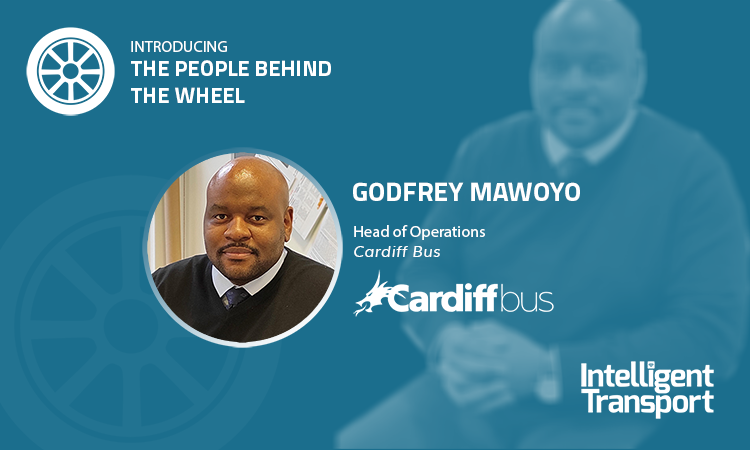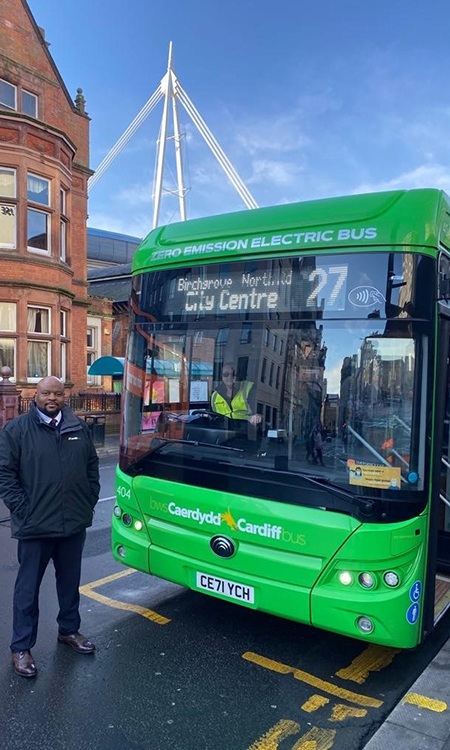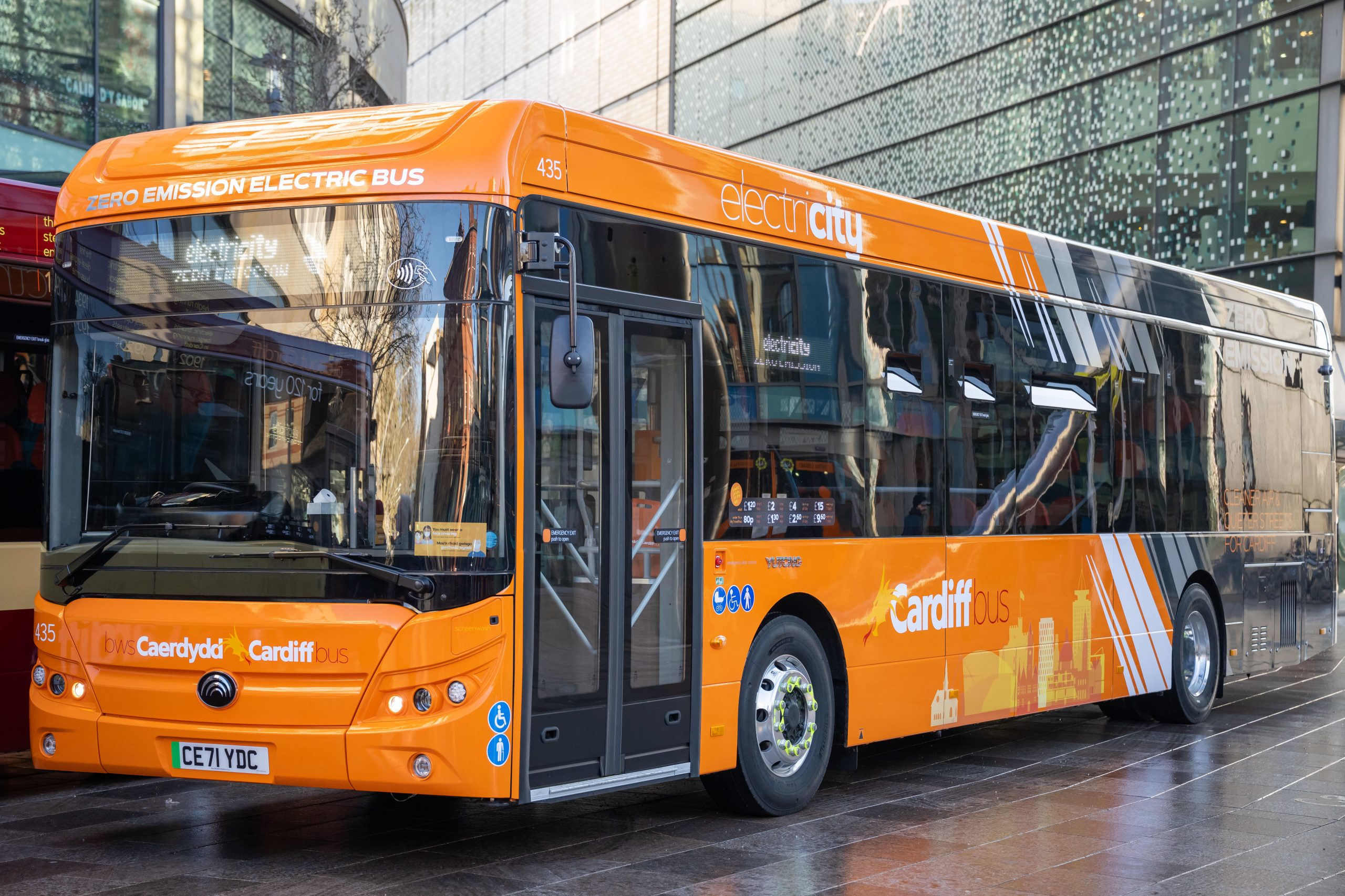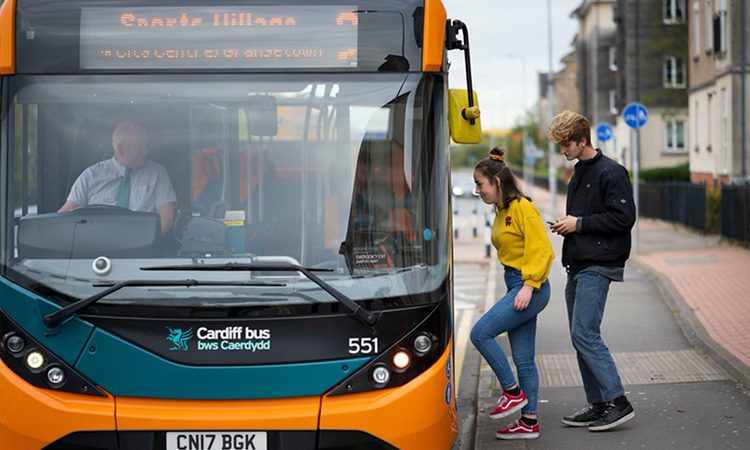The people behind the wheel: Godfrey Mawoyo’s story, Cardiff Bus
- Like
- Digg
- Del
- Tumblr
- VKontakte
- Buffer
- Love This
- Odnoklassniki
- Meneame
- Blogger
- Amazon
- Yahoo Mail
- Gmail
- AOL
- Newsvine
- HackerNews
- Evernote
- MySpace
- Mail.ru
- Viadeo
- Line
- Comments
- Yummly
- SMS
- Viber
- Telegram
- Subscribe
- Skype
- Facebook Messenger
- Kakao
- LiveJournal
- Yammer
- Edgar
- Fintel
- Mix
- Instapaper
- Copy Link
Posted: 14 February 2023 | Godfrey Mawoyo - Cardiff Bus | 1 comment
For the first instalment of Intelligent Transport’s exclusive ‘The people behind the wheel’ series, Godfrey Mawoyo, Head of Operations at Cardiff Bus, shares how his love for being on the road first inspired him to seek a career in the public transportation sector, as well as why he thinks it is important for people to think outside the box and start from the bottom up when pursuing a career in the industry.


Can you tell us about your role at Cardiff Bus?


Credit: Cardiff Bus
The primary purpose of my role is to lead the Operations team and co-ordinate day-to-day activities. I am responsible for direct line management of the Operations management team, along with the admin and support staff. My role reports directly to the Service Delivery Director.
At Cardiff Bus, no two days are ever the same for me. But, typically, I spend some time reviewing operational performance data against set standards and, where appropriate, I initiate remedial action to address shortfalls. A significant part of my role also has to do with performance management.
Amongst other operational activities, my team is responsible for managing absenteeism, driving standards and driver conduct. The impact on employee relations means that we work closely with human resources to ensure that constructive employee engagement is maintained.
My role also bridges the gap between the Senior Leadership Team and operational colleagues. This includes communicating strategy and priorities, as well as reporting on operational performance.
What inspired you to seek a career in the transport industry?
The idea of driving a large vehicle and spending the day on the road instead of being stuck in an office or warehouse of some sort had always been appealing to me”
I have always been passionate about everything transport related – including buses, trains, planes etc. The idea of driving a large vehicle and spending the day on the road instead of being stuck in an office or warehouse of some sort had always been appealing to me. I used to work for Royal Mail sorting mail and, occasionally, I would do overtime with distribution loading and off-loading mail from lorries overnight. So, I spent a lot of time engaging with distribution colleagues and learning about their roles.
For a period, I seriously entertained the idea of becoming an HGV driver; however, back then, there were little to no funded training programmes available – unlike today, so I decided to join a bus company instead and get training for a PCV licence.
I spent the next four years as a PCV driver in London and thoroughly enjoyed the freedom of being on the road; however, towards the end, I started thinking more about my long-term career. As much as I enjoyed driving, I knew that I didn’t want to do that for the rest of my working career, so I started focusing more on personal development and career progression leading up to my current role.
Has a career in transport changed your perception of the industry as a whole?
I have worked in the transport industry for most of my adult working life, so based on that experience, I wouldn’t say my career has changed my perception. However, it has made me more aware of the impact and importance of the transport industry to the wider economy and society.
In my view, public transport has a greater role to play in society than it gets credit for. Perhaps what’s always lacking is recognition until the situation is critical”
The recently well publicised shortage in professional drivers manifested itself through empty shelves in supermarkets and reduced bus services due to a shortage of bus drivers across the country. All of these outcomes continue to have an impact on people’s lives and decision making, including how they choose to shop and how they choose to travel.
In relation to public transport, more people use private cars than need to because public transport just isn’t well positioned to serve communities the way that they want with the current challenges. The impact is visible through increased congestion, higher emissions and passenger numbers that are still lagging pre-COVID figures, amongst other things.
Local economies are also affected by transport provisions, so in my view, public transport has a greater role to play in society than it gets credit for. Perhaps what’s always lacking is recognition until the situation is critical.


Credit: Cardiff Bus
What would be the top three highlights of your career in the industry to date?
I think the first highlight would be the time I actually got into the industry in the first place. It was completely different to what I used to do and quitting my job to go drive buses at 21 was a little bold, but it set me off on a good path and overall, I have enjoyed and continue to enjoy working in the industry.
Secondly, in my last role as an operations manager, I was selected to represent the company on Transport for London’s (TfL) fatigue management working group. That was an honour. Being trusted with such an important project at a time when fatigue management was a sensitive subject across the board was crucial, not only for my personal development, but it was also an opportunity to engage with TfL and other bus operators in a manner that I would not normally have been exposed to.
The third highlight of my career would be my decision to re-locate to South Wales in 2020 – in the middle of the pandemic – to join Cardiff Bus as their Head of Operations. The move was significant, because I’d spent all my working life in London, and I was moving to a new city with a completely different culture to what I was used to. On reflection, this was the right move for me, but at the time, trying to re-locate between lockdowns coupled with learning a new business was challenging.
Where do you see yourself in five years’ time?
The one thing I have learnt through my career is that you should never make your plans too rigid. Over the years, most of the opportunities that I have taken advantage of came up when I least expected them. To that end, whilst it may be reasonable to assume that in five years’ time I would still be contributing to the transport sector in some shape or form, I honestly have no idea what I will be doing.
My focus is on personal development, with a specific interest in learning new subject areas. I generally remain open minded about where I’ll be in five years’ time.


Credit: Cardiff Bus
What key pieces of advice would you give to someone who is interested in a career in transport?
I think you need to consider why you want to be in the transport industry in the first place. For some people, there is natural interest in vehicles, so it’s easier to want to work with something you like. It is hard work, and it can be a labour of love, but it can equally be rewarding.
I would always encourage anyone who wants to work in the transport industry to do their research. There are various modes of ‘transport’, and it’s important to establish where your interests lie. A lot of information will be available publicly through company websites and marketing materials, reviewing these can give an insight into whether organisations and roles are suitable for you.
Think outside the box and consider that usually, it will be easier to progress within an organisation than starting at higher levels”
I’d also encourage people to think about entry points into the organisations that they are interested in. For most transport organisations, driving roles will be the easiest way in with minimal barriers to entry. Think outside the box and consider that usually, it will be easier to progress within an organisation than starting at higher levels. Most organisations will offer apprenticeships or other training programmes designed to attract new entrants.
People should also try and talk to others in the industry about roles that are of interest to them, and if possible, try and secure a site visit, tour, or attend open days. If the role that appeals to someone is not front line or easy to get into, I would still encourage people to get into the industry first then focus on career development.
In an ideal world, what do you hope the future of public transport will look like?
In future, I would hope that whatever (transport) model is adopted provides sufficient stability to allow operators to focus on doing what they do best – delivering services”
In an ideal world, I hope the future of public transport more closely reflects the needs of the end user than they do today. There needs to be a more balanced relationship between operators and stakeholders. Being able to deliver a safe and reliable service provides meaning to those of us in the industry. However, post-COVID, it is evident that the model of relying on operators as a business is becoming increasingly challenging.
The bulk of my experience was gained in London, where I believe the operating model allowed operators to focus more on service delivery than elsewhere. Unprofitable routes are impossible for operators to maintain and given the impact that public transport has on society, I would strongly suggest that political leadership, will and investment is needed to secure the future of bus services – along with the environmental benefits of new electric buses and removal or reduction of private cars on the road.
Whilst I acknowledge the challenges in London because of COVID, in normal times, London bus operators are better able to predict revenue and plan their resources accordingly. This makes it easier to focus on service delivery. In future, I would hope that whatever model is adopted provides sufficient stability to allow operators to focus on doing what they do best – delivering services.


Related topics
COVID-19, Mobility Services, Modal shift, Public Transport, The People Behind the Wheel Series, Workplace
Related modes
Bus & Coach
Related cities
Cardiff
Related countries
United Kingdom, Wales
Related organisations
Cardiff Bus, RATP Dev London, Transport for London (TfL)
Related people
Godfrey Mawoyo









an excellent article, and work ethic, there is much about the bus industry that cannot be taught, so experience and working your way up can be key to a firm all round knowledge, a very interesting read.